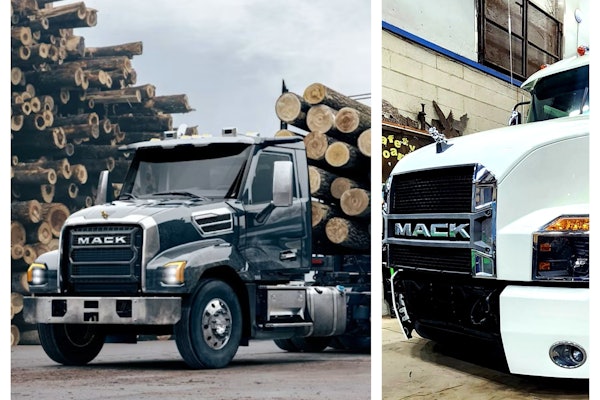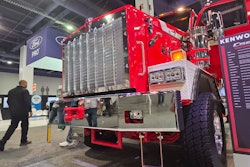Recorder rule to be broader
The chief of the Federal Motor Carrier Safety Administration hinted the final electronic onboard recorder rule will be expanded to cover more trucking operators and could lead to a universal mandate.
Chief John Hill said the final version of the EOBR goes beyond a proposed rule that requires habitual violators of the hours of service rule to use recorders. FMCSA has sent the rule for review to the White House Office of Management and Budget. It is scheduled to be released by the end of the Bush administration, but it’s unclear if that will happen.
As proposed, drivers and trucking companies would be required to use recorders if they exceed the hours rule at least 10 percent of the time. Violations would be measured in two reviews within a two-year period. Fewer than 1,000 of the estimated 650,000 carriers FMCSA regulates would fall within that range.
Hill told Overdrive the rule’s mandatory requirement now is expected to cover more carriers. He predicted the final rule may lead to a universal EOBR mandate, which will require changes in federal law to occur.
“I think you will see large numbers of fleets adopting technology, in terms of GPS and wireless technology applications, that could be used for electronic onboard reporting,” he said. “You’ll see enough of the industry outfitted that you could make the leap to a universal mandate.”

Such a requirement will require Congress passing a new law. Under existing law, FMCSA has to justify its rules with a cost-benefit analysis. Hill said, “You can’t get enough benefits from people’s lives saved and [fewer] injuries for the cost it would impose on the industry.”
In January 2007, FMCSA proposed to require EOBRs on all trucks operated by carriers that had a record of serious or repeated non-compliance with hours of service.
– Max Kvidera
CARB approves ‘SmartWay,’ diesel retrofit rules
The California Air Resources Board on Dec. 12 adopted regulations that would require fleet owners operating in California to begin replacing older trucks or retrofitting them with diesel exhaust filters, beginning in 2011. Under the rules, almost all vehicles covered would be replaced or upgraded by 2014. Owners also must replace engines older than the 2010 model year according to an implementation schedule running from 2012 to 2022.
CARB also adopted a rule aimed at reducing greenhouse gases, such as carbon dioxide, by requiring long-haul operators of 53-foot box type – dry van and refrigerated – trailers to use fuel-efficient tires and aerodynamic devices as certified by the U.S. Environmental Protection Agency’s SmartWay Transport Partnership. The goal is to reduce greenhouse gases by improving fuel economy.
Low rolling-resistance tires will be required for all new tractors – both day cabs and sleepers – pulling 53-foot box-type trailers, effective with the 2011 model year. As of 2012, older tractors must use low rolling-resistance tires. In addition, CARB still plans to require that sleeper-equipped tractors pulling 53-foot box-type trailers be SmartWay-certified models as of model year 2011.
– Avery Vise
Georgia trucker wins customized rig
Todd Dailey of Monticello, Ga., won the Chrome Shop Mafia’s Sweet Freedom Custom Truck Give-Away. Dailey, a former owner-operator, began working as a company driver following Hurricane Katrina. Now he plans to lease with a local carrier. Midnight Trucking Radio and J.B. Hunt Transport teamed with the Chrome Shop Mafia to award the fully customized Freightliner Century Class, valued at $100,000.
Natural gas-powered trucks driven to clear ports’ air
Owner-operators contracted to drayage company California Cartage are gaining access to new liquefied natural gas-powered trucks from Daimler Trucks North America under a program to reduce pollution at the ports of Los Angeles and Long Beach.
Cal Cartage is taking delivery of 132 Sterling Set-back 113-inch, 320-hp daycabs as part of a long-term plan to make trucks under its control greener. The company is exchanging the 2010-compliant LNG trucks for the oldest, most heavily polluting trucks driven by its owner-operators.
Most of the cost of the trucks is being provided by about $12 million in U.S. Environmental Protection Agency grants and a state program. Owner-operators will pay about $500 a month under a seven-year lease before gaining ownership of the vehicles.
“We have a program with a bank that takes the balance of the payments and leases the truck to the drivers,” says Bob Lively, vice president of strategic planning for Cal Cartage, which contracts with about 1,200 owner-operators. In return, the bank obtains a federal tax credit for purchasing alternative fuel equipment.
After the LNG trucks are distributed, Lively says, the company plans to purchase about an additional 300 Daimler trucks that will be either LNG or compressed natural gas-powered. The Daimler trucks, scheduled for delivery beginning in the second quarter of 2009, might include Sterlings, Freightliner Model M2-112 trucks, or the Freightliner Columbia, which Lively prefers for its larger cab. The company also hopes to deploy another 25 Sterling trucks for its operations at the Port of Oakland.
Cal Cartage and other companies are moving from Sterling to Freightliner because Daimler is dropping the Sterling brand and ending manufacturing in March.
– Max Kvidera
Rules tougher for new carriers
New carriers will have to survive a more rigorous test of their safety fitness under new rules issued by the Federal Motor Carrier Safety Administration.
The regulations, as published in the Dec. 16 Federal Register, identify 16 violations that FMCSA deems to be essential elements of basic safety management controls necessary to operate in interstate commerce. Failure to comply with any one of those 16 regulations results in an automatic failure of the new entrant safety audit, which is supposed to occur within the first 18 months of a new entrant’s operation.
The new regulations also will require that new entrants correct certain deficiencies found in roadside inspections on an expedited basis. FMCSA also will check compliance with the Americans with Disabilities Act and certain household goods-related requirements in the new entrant safety audit, if applicable. Failure to comply with these requirements won’t affect the outcome of the safety audit, but the agency will take action to improve compliance.
FMCSA also has improved its educational and technical assistance materials to ensure applicants understand applicable federal motor carrier safety standards. And the agency is eliminating the safety certification application for a U.S. DOT number (Form MCS-150A), saying it is not effective for establishing a carrier’s knowledge of safety requirements.
Among the 16 “sudden death” violations, 14 would lead to failure of an audit based on a single occurrence. Two regulations – failing to require a driver to make a record of duty status, and using a commercial motor vehicle not periodically inspected – require a threshold of 51 percent or more of examined records to trigger automatic failure. The agency said use of thresholds responded to complaints that a single occurrence standard would unfairly discriminate against larger new entrants.
The rule takes effect in mid-February. The Obama administration can invalidate the new rule for any reason, but indications are that Obama’s administration will have no problem with the new entrant regulation.
– Avery Vise
Diagnostics mandated for 2010 trucks
On-board diagnostic systems, required on cars since the mid-1990s, will now be required on heavy-duty vehicles for 2010 models and later.
The U.S. Environmental Protection Agency issued a final rule Dec. 4 mandating OBD systems on heavy-duty engines in vehicles weighing more than 14,000 pounds. The OBD requirements will increase hardware costs about $60 per diesel engine and $70 per gasoline engine.
Diesel heavy-duty applications for less than 14,000 pounds have complied with OBD requirements since 2004.
EPA is also requiring manufacturers to make available to the service and repair industry information necessary to repair and maintain these systems and other emission-related engine components.
The agency considers the rule a major step to work with the California Air Resources Board to develop a national heavy-duty OBD program. OBD systems improve air quality that helps states meet National Ambient Air Quality Standards. In September, the EPA granted a federal preemption waiver to California to implement OBD requirement on heavy trucks.
– Jill Dunn
Arrow Truck giveaway deadline at hand
Arrow Truck Sales will accept nominations for its Back on the Road 2009 program through Jan. 16 at www.backontheroad2009.com. Truckers who have no access to computers are encouraged to seek a friend’s help or a local library’s computer services to submit the entry online.
Arrow, part of the Volvo Group, is soliciting stories from truckers who lost their truck and their livelihood through unfortunate circumstances. The winning trucker will receive a 2006 Volvo VNL 670, courtesy of Volvo Trucks North America, a one-year work agreement with Heartland Express and products and services from ATBS, Chevron, Michelin, Minimizer Products, the Owner-Operator Independent Drivers Association, National Truck Protection and Volvo Parts.
Entries should include a 250-word explanation of why the entrant deserves to win. Arrow will announce the winner during the Mid-America Trucking Show, March 19-21, in Louisville, Ky.
– Staff reports
Federal rule sets medical certificate requirements
Interstate commercial driver’s license holders subject to the physical qualification requirements of the federal safety regulations will have to provide a current copy of their medical examiner’s certificates to their state driver licensing agency under a long-awaited final rule published Dec. 1.
The Federal Motor Carrier Safety Administration’s final rule also requires the state agency to record on the Commercial Driver License Information System the self-certification the driver made regarding the applicability of the federal driver qualification rules and the medical certification status information required by the rule.
The rule takes effect Jan. 30. States must comply by Jan. 30, 2012, and all CDL holders must submit their self-certification by Jan. 30, 2014, as to whether they are subject to the physical qualification rules.
FMCSA said the rule will help prevent medically unqualified drivers from operating by giving state licensing agencies a means of identifying interstate CDL holders who can’t obtain a medical certificate and of taking action to downgrade their CDLs accordingly.
The rule also will act to deter drivers from submitting falsified medical certificates because FMCSA and state enforcement personnel will now have access to information about the medical certificate and the identity of the medical examiner who performed the examination.
– Staff reports
SHORT HAULS
DIESEL FUEL will cost much less in 2009, according to sharply reduced projections from the U.S. Department of Energy. The agency points to a decrease in global energy demand and a global economic downturn. DOE predicts U.S. diesel prices will average $2.73 per gallon, down $1.08, or 28 percent, from 2008’s average.
A DISBARRED ATTORNEY is now chief operating officer at Gainey Corp, which is working through a Chapter 11 bankruptcy reorganization. The Michigan Attorney Discipline Board ordered Carl Oosterhouse’s law license revoked July 30, which he petitioned for review. Oosterhouse admitted to professional misconduct, which included conversion of client funds and misappropriation of client and law firm funds.
PENNSYLVANIA STATE POLICE issued 382 citations in a one-day enforcement of truck inspections on rural roads and on non-interstate highways. Police say similar enforcement blitzes are planned for 2009. The citations included 246 written for commercial vehicle defects and 114 for driver violations; 91 commercial vehicles and 21 commercial vehicle drivers were pulled out of service for violations.
ILLINOIS TOLLWAY Board of Directors approved raising tolls on trucks by 60 percent. The increase will be phased in from 2015 to 2017. The approval for the toll increase for trucks comes four years after the tollway increased truck tolls by as much as 300 percent, says the Mid-West Truckers Association.
ANOTHER DECLINE was recorded for the American Trucking Associations’ seasonally adjusted For-Hire Truck Tonnage Index. The index fell 3 percent in October, the fourth consecutive month-to-month drop. ATA Chief Economist Bob Costello says truck tonnage is down a total of 6.3 percent the last four months.
A MEMO from the International Fuel Tax Agreement explains the IFTA grace period for the display of IFTA licenses and decals. Although carriers that operate under IFTA are expected to file their renewal applications with their base state before the end of the calendar year, they have until the end of February to display the 2009 IFTA license and decals on all their IFTA vehicles. During January and February, an IFTA vehicle will be considered legal if it displays 2009 IFTA credentials, an IFTA trip permit or the 2008 IFTA license and decals.
LUBRIGUARD: The company’s telephone is (800) 428-9284, ext. 3103. An incorrect number appeared in an advertisement in the December issue.
HIGHWAY HAPPENINGS
COLORADO. The state Department of Transportation said it plans to pave 60 truck parking spaces at the northwest corner of the I-70 ramp at exit 133 in Dotsero.
GEORGIA. The federal government is investing $110 million to support a Georgia state plan to reduce traffic congestion in Atlanta. The first phase will institute a network of variably priced high-occupancy toll lanes on I-85, from I-285 to Old Peachtree Road, by January 2011. Future phases will include a 49-mile network of additional HOV-to-HOT lane conversions along I-85, I-75 and I-20.
NEW JERSEY. The average truck trip toll on the New Jersey Turnpike increased by $2.05 in 2008 and will rise $3.75 in 2012. The toll for the average truck trip on the Garden State Parkway rose by 60 cents in 2008 and is scheduled to increase 95 cents in 2012.
NEW MEXICO. The New Mexico Department of Transportation is increasing speed limits on two state roads after speed studies suggested they were too low. The limit on U.S. 70 west of Roswell has been increased from 65 mph to 70 mph for a 23-mile stretch of the road. On U.S. 82 west of Artesia, the limit was raised from 55 mph to 65 mph for 31 miles.








